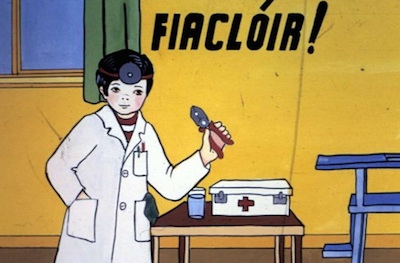
By Laura Kennedy (for the Irish Times)
I loathed Irish at school. Thirteen years of study created nothing but a cloying sense of being smothered by archaism. The way it was taught was limp and bred a sense of fear and stupidity into me that left me blaming the language for years after I finished school.
I still think Irish should be optional rather than mandatory at school, and taught with an emphasis on real life rather than being entombed in a glass box of tradition. But I’m more open to it now. The abhorrence I felt in adolescence has been replaced by more of a benign curiosity and a sense of disappointment at the fact that I have lost it.
Like many Irish people, I wonder how I could have studied a language for 13 years, and, in my head, find nothing but a few straggling nouns and the sense of dread that I carried into the classroom each day. Languages are like muscles - they atrophy with lack of use - but I never felt confident about my ability to use Irish. After all, gach dalta mar a oiltear (every pupil is as he is trained).
This week, I’m saying yes to immersing myself in Irish again. Aware of the bruises left after school, and in the belief that language is at its best when spoken organically between fluent speakers, I headed back to my alma mater, Trinity College.
CAINT AGUS CAULIFLOWER
The university’s Buttery - where I had many a student lunch, including a stroganoff that inexplicably contained gherkins, and a lamb stew with cauliflower cheese - is home to an Irish conversation circle every Wednesday morning.
An Cheadaoin ag an mButrach, organised by Trinity’s Irish Language Office as a way to include Trinity in the wider communal life of Dublin, runs between 10.30am and noon. It’s open to anyone of any age; no association at all with the university is required.
I went into it with an echo of the dread I felt at school, where I had blushed in Irish class when I couldn’t understand the teacher. There was also an apprehension as to the kind of people I would encounter. I feared either native speakers who might disdain a novice, or cultural Gaeilgeoiri in Aran jumpers drinking tea strong enough to stand a spoon in.
That was enormously ignorant of me. What I found was quite the opposite: a charming combination of older and younger people of both genders chatting easily about their lives and interests.
It was simply some people, catching up and connecting with each other. They happened to be doing it through Irish. It was so refreshing to see first-year Trinity students chatting easily with older men and women.
Those at the circle were mostly advanced speakers who, for one reason or another, didn’t have an opportunity to use their Irish very often. As I learned upon witnessing their conversation, beatha teanga i a labhairt (the life of a language is to speak it) and I was astounded that I could understand about 70 per cent of what was being said.
Everything from the use of Google Translate and the difference in dialects to the best kind of glasses for night driving was discussed.
GENERATION GAME
Jack, who was at Trinity on work experience that week, was discussing his duties with a man who was clearly enjoying the conversation. There aren’t many occasions when a teenager and a septuagenarian connect on a social level.
However, by the time I’d mentally formed a sentence in an effort to contribute to the conversation, the conversation had moved on. I could feel the rusty cogs of my Irish grinding into gear.
Rather than the closed-off, tight-knit reaction I’d feared, everyone seemed delighted that a novice had joined in and was showing an interest in something the group clearly felt such love for.
I was completely welcome, and noticed that everyone there had turned up alone. That made it easier to feel at home and try to join in. I saw a side of Irish that I’d never seen at school; a warmth and connection that melted away my previous fear and dislike.
It has taken a while, but that conversation group set aside years of conflicted fear of the language for me. I heartily encourage anyone of any level to head in on a Wednesday morning; things aren’t always what they seem. Ni mar a shiltear a bhitear.
![[Irish Republican News]](https://republican-news.org/graphics/title_gifs/rn.gif)
![[Irish Republican News]](https://republican-news.org/graphics/title_gifs/harp.gif)

